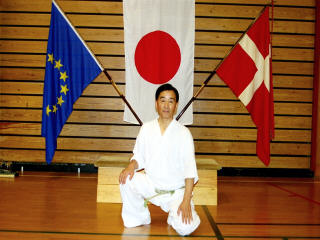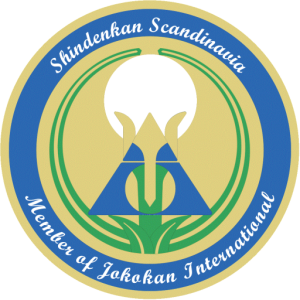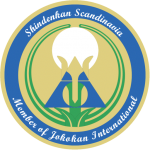
By Jokokan Honbu
Soke Sensei Tonegawa Yukio is coming to Denmark again at the invitation of Jokokan Denmark, Member of Jokokan Europe. Soke Sensei will be accompanied by one or more of his instructors from the dojo in Tokyo. In August, one instructor from the Iwaki dojo will come to Denmark to train and greet.
“SST-2003” will take place at Honbu-dojo from Wednesday, July 2nd to Saturday, July 5th, 2003, where we will end with a bang with a farewell party. There will be expected to be between 60-70 participants at the camp, who will train at different times, so that everyone gets the most out of the teaching from one of today's very old, wide-ranging and insightful Japanese martial arts masters.
Both Yakami-ryu Karate-do and Yakami-ryu Taijutsu will be taught. From our website you can read that Yakami-ryu originally has over 1,000 years behind it and was originally from 4th dan, Okuden and up. When the martial art system was officially opened in 1992, Soke Sensei had therefore established a logical and optimal training ladder up to 4th dan, Okuden.
This system was based on more than 60 years of martial arts experience and was called Yakami-ryu Karate-do. It is based on the same 8 powers and 12 principles as the original Yakami-ryu Taijutsu and Yashin Mon (Spiritual System).
Soke Sensei has always been a very open and humble person, and has never claimed to have the sole right to "the ultimate martial art system". This means that everyone can learn from others and thus also from other martial art systems. It is not healthy to walk around in your own "cheese bell" or blindfolded throughout your life.
Therefore, it is a requirement in Yakami-ryu that through organized courses at the right times in the "career development" one must become familiar with the essence, train, know the history and emphasis of other selected martial art systems from both Japan and China.
The purpose of this is that we strive here to create a more "well-educated" and less judgmental martial artist with respect and acceptance of himself and of other people. Who at the same time knows what she or he is talking about when they are with other practitioners from other martial arts systems.
We are very grateful that Yakami-ryu can offer such a wide range of insight and training in other systems from the main tool Yakami-ryu. This can be done, since most systems at a higher level are based on the same forces and principles, but executed, interpreted and organized by different unique personalities throughout the ages. This is mainly valid up to 5th dan, Menkyo, after which the old Yakami-ryu tools take over completely.
After all, a martial art system is never better than its practitioners at any given time – even marketing cannot change that. After all, we live in and on the same world – Earth.
The main stem is Yakami-ryu, but branches and twigs can be training and insight into the essence of both other koryo (ancient) Bujutsu martial art systems and newer martial arts systems. This so that the practitioner at some point finds his personal realization, essence and path – which is the original purpose of all Budo. If the practitioner really wants this deep down.
Incidentally, this is not a unique characteristic of Yakami-ryu, it is simply the continuation of the old Bujutsu and Budo teaching method, which originally existed in Japan since the dawn of time. Today it is more modern to train one system throughout your life. Many modern systems have a timetabled syllabus for 3-5.dan, after which the subsequent degrees are usually honors degrees.
We don't have this in Yakami-ryu. There is a set curriculum for the 6th dan, Menkyo Kaiden, after which the curriculum is tailored to the individual unique personality within Yakami's 8 powers and 12 principles - completely as it was done in other old martial art systems since the "dawn of time" in Japan and China .
Soke Sensei was born in northern Japan in 1938, and has practiced martial arts since he was 4 years old. He has been in the fortunate situation of being coached by the best at the right times. He has never emphasized his martial art history, as he does not think this matters when it is the "Now" that is at the center, and about what he can actually offer Yakami-ryu's practitioners and others interested in the creation and the realization of themselves, in the "Now".
Not many of his students needed that either. Which, in hindsight, is not so good in this modern world, as the Curriculum Vitae of the past often means more than what the person can actually offer others in the present. This thus opens up more or less fantastic interpretations of the past's lack of marketing and branding by a very modest and humble Soke Sensei Tonegawa, "who lives in the present".
It may actually be strange when you think about the fact that Soke Sensei established Gensei-ryu Karate-do in Denmark from 1967-1974, left behind an organization of 10 Gensei-ryu and 1 Shinen-ryu Karate-do school (Budokan on Amagertorv ) in Denmark when he returned to Japan in 1974. After which he taught his Danish Gensei-ryu organization at training camps in 1975, 1976, 1978, 1980, 1982, 1984 and 1988, and then his Danish Jokokan organization in 1992, 1994, 1996, 1998, 2000 and now soon 2003.
People may have asked and received an answer. We don't actually know, but from the extensive video 8, VHS and footage from all these training camps, you can see that people have concentrated on getting the most out of the training and enjoying themselves in the third half. It must have been really fun judging by the material!
Of the old organization in Denmark, there are now only the 3 schools from Genshikan under Shihan Jess Pedersen, 6th dan and Steen Pedersen, 5th dan and the new 8 schools in Jokokan left in Denmark and Europe. But this previous story is both the story of Genshikan and Jokokan, and thus also Soke Sensei Tonegawa's prehistory in Denmark.
When Soke Sensei comes to Denmark again, we will provide the service for our members and participants at the upcoming SST-03 camp, to briefly tell about Soke Sensei's Budo history. This is done in the form of a short extract from a previous travelogue from our website last year (2002) in February, where previously mentioned paradigms were unexpectedly touched upon:
“…..It was great to hear good news for the Japanese Honbu dojo in Iwaki and the newly started Jokokan school in Tokyo. Soke Sensei's right-hand man in the Tokyo dojo, Matsuda-san has been training with Soke Sensei for the past 3-4 years several times a week. He has a long past as a Kendo and Iaido practitioner from the extremely famous and recognized Noma dojo near Nara, and has practiced full-contact Thai boxing at an elite level for a number of years.
I also had the pleasure of training Yakusoku kumite with Matsuda-san at full blast during one of the training days in Yoyogi Park in Tokyo in brilliant sunshine and 5 degrees Celsius. Matsuda-san and I had a wonderful time, unlike Matsuda-san's video camera, which very quickly went dead in the relatively cold but wonderful weather.
During the subsequent trainings, I again had the pleasure of training basic and kata together with our Soke Sensei Tonegawa, who I must admit is getting better and better over the years - as incredible as it may sound.
Despite his now 64 years, he moves like a young man with lightning-fast, harmonious and incredibly beautiful movements. One feels deeply moved by one's observations of him, and gains incredible respect for Soke Sensei's insight, skill and knowledge. He really expresses BUDO and BUJUTSU, which you only read about in the old books about the legends of martial arts.
Based on the debate of recent years, which has mainly taken place with some Danish Gensei-ryu Karate-do practitioners, we also talked about this. As Soke Sensei said, it was strange that for 32 years he has been recognized as the Japanese who introduced Gensei-ryu Karate-do in Denmark without a sword strike, and then suddenly strong doubts have been sown about this by former students (what we can understand confusing debate), and relatively very new practitioners of Gensei-ryu karate-do in the last few years.
But as we agreed, these critics probably had a special motive or interest in starting this rather confusing debate over the Internet or during internal meetings.
However, the interesting output of this talk was also that, after curious inquiry, the next day I was presented with a large amount of history, in the form of various certificates, diplomas, articles, videos, original manuscripts and documents, as well as pictures of Soke Sensei and his master teachers during various training situations and social gatherings. It was fun to see and hear about his grandfather, Yakami's old Soke, Wado-ryu Karate-do's, Kobayashi Sensei (1922- ), 8th dan at the training in Shotokan's JKA Yotsuya-dojo over Goju-ryu karate-do the training in the Akita dojo.
For the meeting, training and friendship with Gensei-ryu Karate-do and Taido's Shukuminé Sensei (1925-2001) for some twenty years, for the start-up of Gensei-ryu Karate-do in Denmark, five articles with pictures in "Taido nyt" at the request of Shukumine Sensei for marketing purposes about Europe, Paris and especially Denmark, for private visits by Shukumine Sensei to Soke Sensei's childhood home in Aomori. 8 mm narrow film taken by Soke Sensei's wife of Shukumine Sensei performing Taido kata and kihon, seasoned with private letters from Shukuminé Sensei to Soke Sensei during his stay in Denmark together with many 8 mm narrow films (1967-1974), for the period when the relationship slipped away completely in the early 80s.
The certificates and pictures of Soke Sensei during the years of training with his Chinese martial arts teacher Shakua Sei Sensei, "National treasure" from southern China and his right hand man, manifested themselves in the training lessons the next day. Which his over 20 years of training with BUIDO's Soke, Minouchi Sensei (1922-1991) and the Meditation Grandmaster, Nagano Sensei (1913-) also did.
In addition to the above-mentioned teachers, Soke Sensei has trained with other teachers throughout his life, who he felt could increase his enormous knowledge, insight and skills. Some of these I myself have met and been trained by.
Well, enough talk about this. The participants will hear about and see more during Jokokan's annual 2002 winter camp.
But there is absolutely no doubt that both the past, present and future students of Soke Sensei can rightfully be EXTREMELY proud of their Grandmaster in Budo and Bujutsu, but also the skill and insight they themselves possess after the transmission from this very rare and genuine Budo and Bujutsu capacity.”




